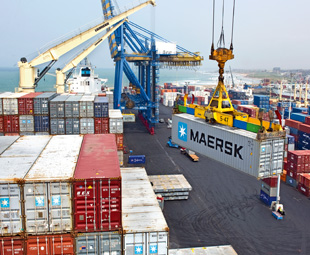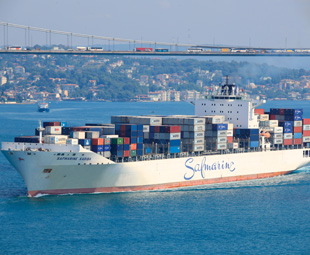The whole nine (ship) yards

Africa has a booming maritime industry. More than 90 percent of the continent’s trade is conducted by sea and it boasts 100 plus ports, with 52 of these handling containers and numerous types of cargo. But is it a day at the beach or troubled waters? JACO DE KLERK investigates.
The shipping industry has a long and industrious history in South Africa. The country’s ports are strategically placed on one of the world’s most important shipping routes. According to Durban-based Elgin Brown & Hamer South Africa (EBH SA), one of the region’s most experienced and established ship repair companies and part of the DCD Marine cluster, the Port of Durban, our busiest port, has risen to the challenges presented by the industry over the years.
South Africa’s ports offer capacity for all types and sizes of vessels, with a full spectrum of docking facilities available to local and international clients. Thus, EBH SA offers a full in-house service in all aspects of ship repair, through its operations in Cape Town and East London – which positions the company to mobilise repair teams in the ports of Richards Bay, Port Elisabeth, Coega and Saldanha Bay.
However, it is important to understand the market in order to adequately meet its changing needs, says Rob Deane, general manager of EBH SA.
“The shipping market is constantly in a cycle of growing and shrinking,” he points out. “It is vitally important to study international trends very carefully before investing in additional capacity. While oil and gas exploration has become a major driver of infrastructure development, it is not always easy to quantify. There are many variables: markets change and the process of analysis has to be ongoing.”
But there has been an increase of maritime traffic around the southern tip of Africa, increasing the demand for ship repairs and making it necessary for Durban to re-assess its capacity and sustainability.
Currently EBH SA operates its own floating dock “Eldock”, as well as repair quay facilities and a 60-tonne floating crane (the only privately operated floating crane in South Africa). In addition, the company has access to the Transnet Ports Authority’s (TNPA) graving dock (the “Prince Edward”), which can accommodate Panamax-size vessels, as well as TNPA’s 100-metre-long floating dock.
 While the purchase of a second floating dock by EBH SA for Durban is on the cards, the acquisition is a “work in progress”, says Deane. The company is currently conducting feasibility studies, negotiating with stakeholders in terms of its location and environmental impact, as well as conducting ongoing research of market trends.
While the purchase of a second floating dock by EBH SA for Durban is on the cards, the acquisition is a “work in progress”, says Deane. The company is currently conducting feasibility studies, negotiating with stakeholders in terms of its location and environmental impact, as well as conducting ongoing research of market trends.
“Because the shipping market is in constant flux, only time will tell exactly what sort of capacity Durban port will require in the future,” notes Deane. “For now, we will continue to focus on providing a superior service to the oil and gas vessels operating off the east coast.”
Meanwhile, on the west coast, EBH SA’s sister company, EBH Namibia, concluded its acquisition of a third floating dock, “Namdock 3”, in October 2013, significantly increasing operational capacity in terms of the number and size of vessels the company can service. With a lifting capacity of 15 000 tonnes, the Panamax dock can berth vessels of up to 195 metres in length and 33 metres in beam.
Namdock 3 represents the largest infrastructural investment that EBH Namibia has made to date, and heralds significant positive implications for the future of Namibia’s economy, according to EBH Namibia CEO, Hannes Uys.
“By enhancing our docking capacity, the new floating dock will substantially increase our capacity to offer shipping clients a one-stop service of global standards,” he points out. “Moreover, the presence of the Panamax dock will enable us to further contribute to the growth of the local economy and establish Namibia as a ship repair destination of choice on the west coast of Africa.”
The company states that is has contributed an estimated N$2 billion (R2 billion) to the economy of Namibia, in terms of downstream revenue and job creation. The new floating dock, which arrived in the port of Walvis Bay on July 5, 2013, will create an estimated 150 new job opportunities.
“As a company, we are strongly committed to developing and up-skilling our existing staff as well as addressing unemployment in the local region,” says Uys. “Our strategic aim is to work alongside our shareholders to create a strong, motivated Namibian workforce, dedicated to the future economic well-being of the country.”
And the economic growth of any African country bodes well for the continent, which has evolved into one of the biggest potential growth markets in the world – with the shipping industry set to grow accordingly. But this sector is being plagued by the scourge of piracy and environmental impacts are taking their toll.
Says James Fisher, CEO of Nautic Africa, a ship building company that specialises in the construction of high-speed, ballistic-protected, aluminium crew and patrol vessels, ranging from nine to 90 m: “If Africa is to continue developing, it is vital that we protect her waters.”
He explains that the challenges of operating off Africa’s coast are vast and daunting. They include illegal, unreported and unregulated fishing, piracy, smuggling, oil pollution, off-shore expansion and even terrorism.
“It is crucial that the ship-building industry takes cognisance of the challenges that are specific to our waters, and rises to meet them,” he adds.
Nautic Africa is doing just that by developing multi-role patrol vessels, which, according to the company, are practical, functional and good value for money. “The multi-role patrol vessels have been developed and built in Africa, specifically for African conditions,” Fisher points out. “They are versatile and re-deployable, fuel efficient, eco-compliant, easy to maintain and sustainable.”
Importantly, Nautic Africa also offers total support to maximise vessel lifespan, including “through-life” support, technical management, system-specific maintenance and integrated logistics support. In addition, it supplies crew and system training.
As well as in South Africa, the company already has bases in Nigeria and Ghana. It also has working relationships with local vessel operators and gas and oil companies.
“The protection of Africa’s waters is crucial to the ongoing development of the continent,” Fisher reiterates. “Governments and private companies need to work together to ensure that we need never write ‘here be dragons’ on our sea-faring maps again!”
However, this will be highly unlikely as Africa’s maritime industry is booming; with companies investing in the continent’s ports, the facilities to maintain more and more ships, and the means to thwart those that hinder the progress of this sector.
Published by
Focus on Transport
focusmagsa




